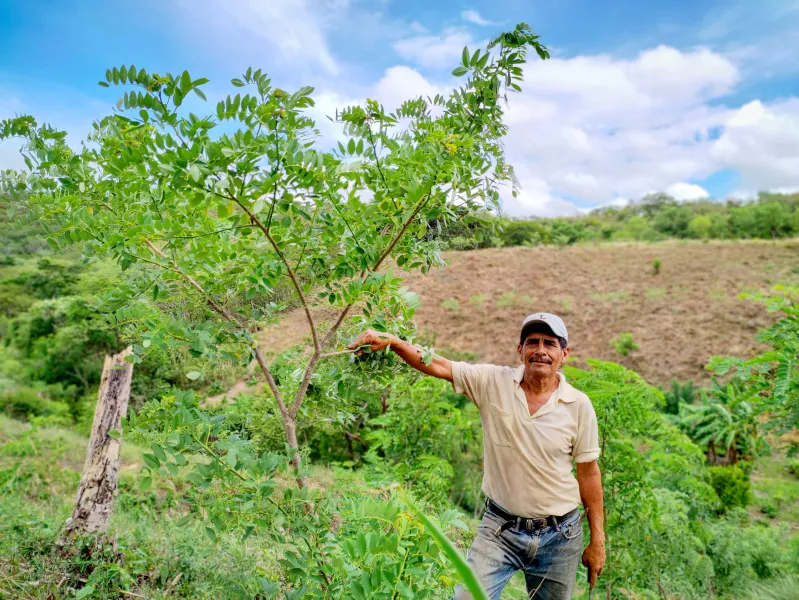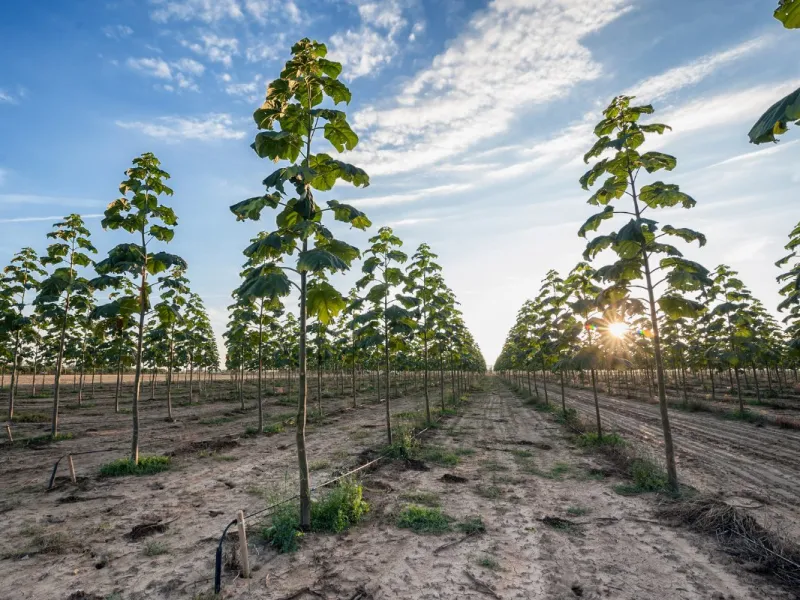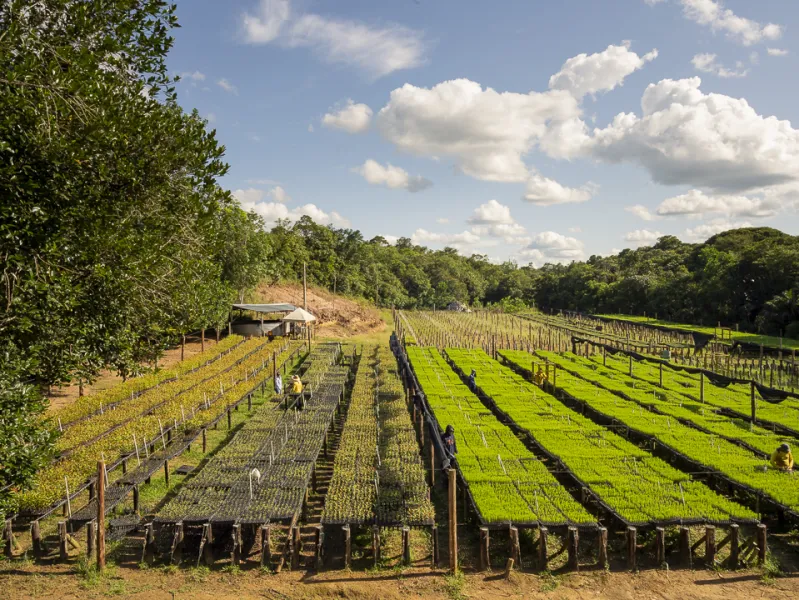1 min. read
·All about carbon credits
What are carbon credits and why are they important?
Carbon credits are a means of reducing the amount of carbon in the atmosphere. On this page, you can read what CO2 is, why it is a problem, and why carbon credits play a central role in tackling the carbon problem.

Carbon dioxide
What is CO2?
CO2 is the chemical abbreviation for carbon dioxide. It is also often referred to as carbon. It is a gas naturally present in the atmosphere. We cannot do without CO2. Trees and plants need CO2 to grow. Humans and animals, in turn, rely on these trees and plants for food and oxygen. Moreover, CO2, along with other greenhouse gases, helps to trap the sun's heat, making life on earth possible.

The issue
Why is CO2 a problem?
Scientists have determined that there is an increasing amount of CO2 in the air. CO2 is mainly released during the combustion of petroleum, natural gas, and coal. The rise in CO2 emissions contributes to global warming. Most scientists agree that human activities significantly influence this warming. There is extensive research into the exact extent of this influence and the factors involved.

Approach
How do you tackle carbon emissions?
You can avoid, reduce, and/or offset your company's carbon emissions. Avoiding and reducing emissions involves changing, limiting, or stopping certain activities in your company. These changes require adjustments, investments, and time. Offsetting means paying to remove the carbon emissions you cannot avoid from the atmosphere. This action can be implemented immediately.

Offsetting emissions
How can you offset carbon?
Climate projects are key to removing carbon from the atmosphere. Plants, trees, and oceans can all capture carbon. There are also machines that extract carbon from the air or water. These groundbreaking initiatives require investments. Your company can purchase carbon credits from a climate project, supporting the project and offsetting (part of) your carbon emissions.

Carbon uptake
How is carbon removed from the air?
Trees convert carbon into oxygen through their leaves and store the remainder in their wood. Grass stores carbon in the soil. Crops like Paulownia trees, hemp, bamboo, and elephant grass also sequester carbon. After several years, they are harvested and can be used, for instance, as building materials; new planting then resumes the carbon storage cycle. Additionally, carbon is extracted from water by coral and seaweed. Furthermore, there are machines designed to capture carbon from the air.

Projects
What are climate projects?
Climate projects contribute to a better living environment. Ecommit collaborates with climate projects both domestically and internationally that offset carbon emissions. These projects use technology, agriculture, reforestation, and other innovative methods to remove carbon from the air. Before we invest in a project, we conduct thorough research. The project must be certified, and the carbon credits must be registered. This ensures that we provide your company with a reliable and effective way to offset carbon emissions.
Projects ecommit collaborates with
When you purchase carbon credits through ecommit, you contribute to significant climate projects that remove carbon from the atmosphere or prevent carbon from entering the air. The projects we partner with are located both in the Netherlands and abroad. Here are some of the various projects:

Paulownia Plantations Croatia
This ambitious project in Croatia focuses on the Anna Paulowna tree (Paulownia), a species known for its exceptional carbon absorption capabilities.

Scolel’te
In the Mayan language Tzeltal, Scolel’te means 'the tree that grows'. This beautiful project in Mexico uses reforestation and agroforestry.

Paulownia Bos Deest
This innovative project in Deest, Netherlands, uses Paulownia trees, which are known for their exceptional carbon absorption capabilities.

Blijvend Grasland
Blijvend Grasland is a collection of excellent projects in the Netherlands. These projects use grasslands to store carbon in the soil.

GreenTrees ACRE
GreenTrees encourages individual landowners to plant forests. The trees remove carbon from the air and are a source of income for the owners.

Carbono Rancho Victoria
Where trees were once illegally logged, pines, eucalyptus, and acacias now remove carbon dioxide from the air.

Delta Blue Carbon
In the Sindh Indus Delta region of Pakistan, mangrove forests are being restored to combat climate change, preserve biodiversity, and improve living conditions.

XiCO2e: Mexican Reforestation Project
Fast-growing Gmelina trees are planted on abandoned farmland and grasslands to absorb carbon from the air.

‘Forteko’ Afforestation on degraded grasslands under extensive grazing
Grasslands that were grazed by livestock in the past are now planted with trees that remove carbon from the air and store it.

Carbon credits
What are carbon credits?
Nature offers various ways to remove carbon from the atmosphere. Plants, trees, and oceans can all store carbon. Additionally, there are technological solutions, such as machines that capture carbon from the air. If your company financially supports a project that either removes carbon from the atmosphere or prevents additional carbon from being released, you receive a carbon credit. One carbon credit represents one tonne (1,000 kg) of carbon emissions removed or prevented.

Carbon credits
Why buy carbon credits?
Purchasing carbon credits is an effective way to make your business more sustainable. By contributing to a project that removes carbon from the air, you can offset a portion of your company's emissions. You decide the extent of this contribution. The climate projects partnered with ecommit are certified, and the carbon credits are registered. We ensure that each carbon credit represents carbon that has genuinely been removed from the atmosphere.
Reliability of carbon credits
When you contribute to a climate project, you need to trust that everything is in order. That the project truly exists and provides carbon offsetting. And that the offsetting you pay for is not also sold to other companies. This assurance is crucial.
Regulation
There are rules for measuring, validating, and verifying the effectiveness of climate projects and carbon removal technologies. These rules govern what can and cannot be certified and define exactly what qualifies as carbon credits.
Certification
Each project undergoes thorough scrutiny. For instance, in a reforestation project, details such as tree species, trunk diameter, growth process, and total carbon sequestration are documented. Projects meeting all standards are certified.
Registration
A certified climate project and its associated carbon credits are recorded in a public registry. This registration ensures that a carbon credit is always traceable and cannot be double-sold.

In The Netherlands
Types of projects in the Netherlands
There are various methods to remove carbon from the atmosphere, and their effectiveness depends on several factors. These include land area, soil conditions, climate, legislation, and technological advancements. In the Netherlands, agroforestry, grassland, and natural methods like seaweed, oysters, and seabed (collectively known as blue ocean) are used to offset carbon. Additionally, Direct Air Capture machines can also be employed to extract carbon from the air.

Temperature goal
Why is offsetting necessary?
The Paris Agreement aims to limit global temperature rise to 2 degrees Celsius by 2050, with a target of 1.5 degrees. Research by the Intergovernmental Panel on Climate Change (IPCC) shows that efforts to reduce carbons emissions alone will not be enough to limit global warming to 1.5 degrees. To achieve this temperature goal, removing carbon from the atmosphere is also essential.

Climate laws
Legislation and regulations
The legislation stemming from the Climate Agreement requires companies to make their operations more sustainable, both now and in the future. Ecommit keeps track of all legal developments and is well-informed about the laws and regulations that apply to businesses. Key topics that your company may need to address include the Corporate Sustainability Reporting Directive (CSRD), the EU Carbon Removal and Carbon Farming (CRCF) Framework, the Reporting Obligation on Work-Related Mobility (WPM), and the Green Claims Directive (GCD).
What do carbon credits offer your company?
Appeal to partners
Sustainability is increasingly important to partners and suppliers. By purchasing carbon credits to offset emissions, you demonstrate that your company is actively engaged in sustainable practices.
Employee engagement
Employees often feel more connected to a sustainable employer. Carbon offsetting also attracts new, talented individuals who align with your company's values.
Customer attractiveness
Businesses and consumers are becoming more conscientious and prefer companies committed to sustainability. Many customers are willing to pay a premium for sustainable products and services.
Product differentiation
Carbon credits distinguish you from competitors. By prioritizing sustainability within your business, you add value to your product or service and gain a competitive edge in bids.
Critical for financing
A sustainability plan is highly valued by banks and other financiers. Efforts to avoid, reduce, and offset carbon emissions are often a requirement for funding.
Forward-thinking image
Sustainable business practices benefit the climate and enhance your brand. Purchasing carbon credits shows that your company values leading-edge initiatives and is committed to staying ahead in the market.
Why buy carbon credits through ecommit?
Diversified carbon credit portfolio
We select different types of projects in multiple locations (country and/or region) and from different registries.
Risk management
Through thorough checks, continuous monitoring, and the application of the latest quality standards and recognized frameworks, we minimize risks and guarantee reliability.
Total service for purchase and settlement
We take care of the entire process from contract negotiations to transactions and administration, so you are always assured of the best conditions.
Smart dashboard
Manage, analyze, and optimize your carbon credits in one clear platform, with direct access to complete, transparent reports.
Buy your carbon
credits now
Invest in carbon credits before prices rise. This allows you to implement your sustainability strategy while enabling essential climate projects.
Reliable
The carbon credits come from certified, registered projects that guarantee carbon offsetting.
Quick and easy
Purchasing carbon credits is easy. Order online or make an appointment for a customized carbon credit portfolio.
Strategic investment
Carbon credits are an investment and create value for your company. Invest now and stay ahead of price increases.
Flexible
Decide at any time what you want to do with your carbon credits: use them in your business, retain them, and/or offer them for sale.
Frequently asked questions about carbon credits
When you financially support a project that removes carbon from the air or reduces carbon emissions, you receive a carbon credit. One carbon credit equals one tonne (1,000 kg) of removed or prevented carbon.
One carbon credit represents one tonne (1,000 kg) of carbon emissions removed or prevented. As of January 2026, a carbon credit at ecommit costs €22.50 (excluding VAT). The price is a weighted average of multiple climate projects. The price per tonne of carbon is expected to rise in the future.
Yes, there are various types of climate projects across different countries. These projects employ different methods to offset carbon emissions. Some projects focus on agriculture, agroforestry, or reforestation to offset carbon. There are also blue ocean projects that utilize opportunities from seas and oceans. Biochar projects involve converting organic waste materials into biochar, a substance that can sequester carbon. Direct Air Capture projects use machines to remove carbon from the air. REDD+ projects aim to prevent deforestation and forest degradation.
When you purchase carbon credits from ecommit, we register the carbon credits in your company's name. The moment you purchase carbon credits does not have to be the same moment you use them. The act of actually using your carbon credits is called retiring. When you retire your carbon credits (now or in the future), the carbon removal is attributed to your company. Once retired, carbon credits can no longer be used or sold.
No. Offset is always realized in solid climate projects. There, a so-called holding pool ensures that offsetting is guaranteed. The holding pool contains carbon credits that are deliberately set aside each year to cover the shortfall in carbon uptake in the event of a fire, but also in the event of drought or insufficient carbon storage, for example. The size of this holding pool is included in the project plan.
Your company’s carbon emissions can be avoided, reduced, and/or offset. Avoiding and reducing emissions involves changing, limiting, or stopping certain activities altogether. Offsetting, on the other hand, means contributing financially to climate projects that remove the carbon emissions you cannot eliminate from the atmosphere, either partially or entirely.
CDR stands for carbon dioxide removal. Other terms used to describe this process include carbon offsetting, carbon capture (and storage), and CO2 capture. These terms refer to the same concept: the removal of carbon dioxide from the atmosphere after it has been emitted.
Although carbon offsetting and carbon removal are often used interchangeably, the terms do not mean exactly the same. Carbon removal involves removing carbon that is in the atmosphere. There is also carbon reduction, which involves ensuring that less carbon is released into the air. Carbon offsetting means taking emitted carbon out of the air elsewhere (removal) or emitting less carbon elsewhere (reduction). Other terms often used are: CDR or carbon dioxide removal, and carbon capture.
A climate project removes carbon from the air. Nature provides various opportunities for this, including plants, trees, and oceans storing carbon. There are also technological solutions, such as machines that capture carbon from the air or water. To implement these groundbreaking initiatives, funding is required. Ecommit invests in diverse climate projects carefully selected based on rigorous criteria. Your company can purchase carbon credits from one of these projects. This way, you offset carbon emissions and promote sustainability within your business.
Ecommit can advise your company on any questions regarding carbon emissions. We only sell carbon credits from certified and registered projects. This ensures that the project is constantly monitored and that it effectively contributes to carbon offsetting. Ecommit neutralizes the carbon credits and provides your company with all necessary documents for accounting and reporting. All transactions are tracked by blockchain.
At ecommit it is possible in some cases to purchase forwards. These are carbon credits that have yet to be issued from a project that has already been validated. Thanks to your purchase, money goes directly to the project. In this way, you take on part of the entrepreneurial risk of the project developer. Forwards are often attractive in terms of price.
When you contribute to a climate project, you need to trust that everything is done correctly. Certification ensures this. Certification involves thorough monitoring of the project from its initial planning stages through to implementation. For instance, in a reforestation project, details such as tree species, trunk diameter, growth process, and total carbon capture, also known as carbon dioxide removal (CDR), are carefully documented. If everything complies with the rules, the project can issue valid carbon credits.
Reducing or even preventing emissions is the best course of action. However, this is not something that can be achieved overnight. Your company needs to explore feasible alternatives, which involves significant investments and adjustments to business processes. To achieve climate goals, Oxford University advocates for companies to start offsetting emissions now. By reducing emissions, the reliance on offsetting can be gradually reduced in the future. However, there will always be residual emissions, necessitating ongoing carbon offsetting efforts.
CO2 is a greenhouse gas, like methane and nitrous oxide. All greenhouse gases can be converted to CO2 equivalents. This conversion is called CO2-equivalent. For instance, 1 kilogram of methane is equivalent to 28 kilograms of CO2. By converting all greenhouse gases of an organization to CO2 equivalents, you obtain a total carbon footprint. This allows comparisons of sustainability performance between companies.
The European Union Emission Trading System (EU ETS) is called the mandatory carbon market. It targets 15,000 European companies and 1,500 airlines responsible for 45% of the EU's total carbon emissions. These companies must compulsorily buy emission allowances. For every tonne of carbon emissions, they must surrender one allowance. Each year the number of allowances is reduced, forcing the companies to produce more sustainably. The voluntary carbon market is for companies not covered by the EU ETS. They buy carbon credits from projects that take carbon out of the air or ensure that less carbon enters the air.
At present, these two markets operate independently of each other. However, the European Union is investigating possibilities for integrating these markets, as has already been done in many other countries around the world. How this will take shape is not yet clear.
Stay informed with our blogs
In our blogs, you will find everything you need to know about carbon offsetting. We keep up with legislation, provide the latest news, summarize research findings, and share whitepapers.
2 min. read
·2 min. read
·What other customers say
OOS Energy
It is our company policy to offset 15% of our office staff business flights’ carbon emissions. In ecommit we have found a trustworthy partner who ensures that our investment goes to high-quality climate projects.
Cor Selen, CEO
TansConnect B.V.
Ecommit allows us to contribute to real climate solutions. Not only do we offset the carbon emissions of our employees, we also offer carbon offsetting to customers who use our software to schedule their transports.
Maarten Klanderman, CEO
CarCollect
A broad sustainability strategy is at the core of our fast-growing business and carbon offsetting is a key part of it. We offset the total estimated emissions of our company, including emissions of staff and data storage.
Lev van der Eng, CCO
Questions about addressing carbon emissions?
Do you have a question or do you want more information? Contact us for a free consultation.


